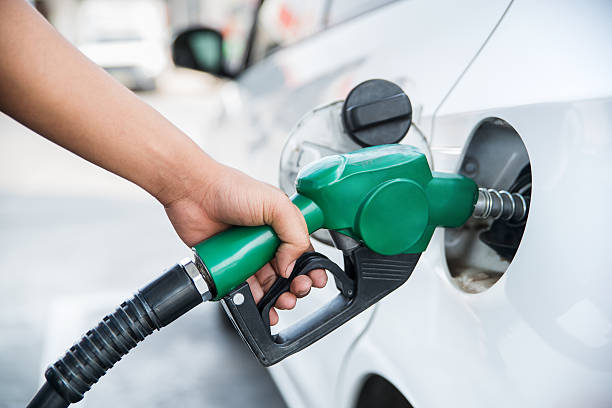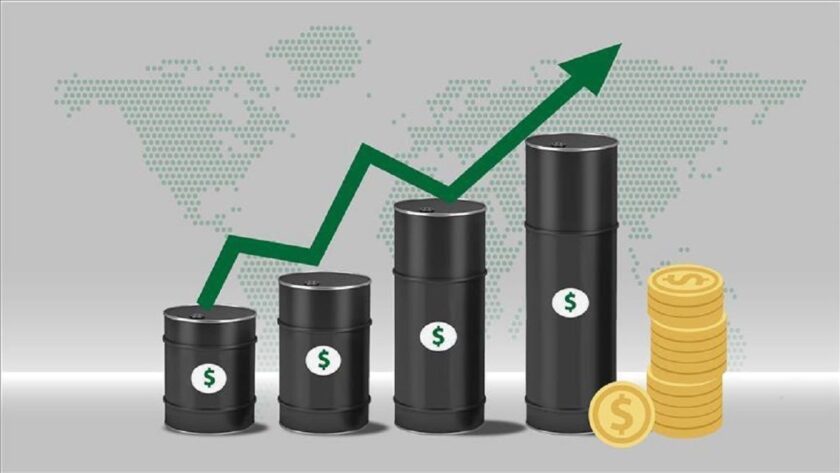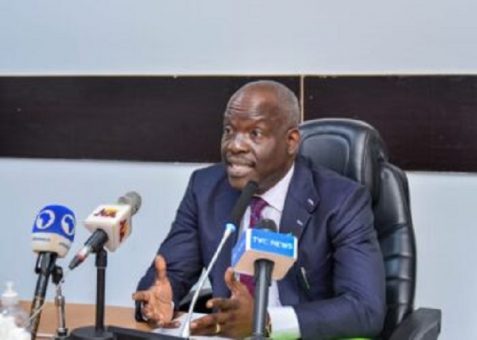Energy
Diesel falls to ₦979/L in Lagos

By Grace Edet
Diesel prices in Lagos have dropped below ₦1,000 per litre for the first time in months, offering rare relief to transport operators, manufacturers and SMEs.
Market checks on Tuesday showed rates as low as ₦979 per litre at Mobil Idowu Egba, ₦980 at NNPC Retail Igando and ₦995 at Petrocam Isheri, driven by stronger domestic supply and heightened competition among retailers.
But fresh cost indicators suggest the drop may be short-lived. New data from the Major Energy Marketers Association of Nigeria (MEMAN) shows diesel landing cost has climbed to ₦980.28 per litre, signalling pressure on retailers and raising the likelihood of a price rebound.
According to market analysts, the rising landing cost is being driven by firmer international prices, higher cargo premiums and renewed bulk purchases by major distributors seeking to replenish stock.
They warn that the current sub-₦1,000 pump prices do not reflect the cost realities facing importers.
Foreign exchange volatility is compounding the pressure. The naira traded between ₦1,430 and ₦1,450 to the dollar over the past week, creating uncertainty for fuel traders and affecting forward pricing.
New coastal pricing formulas tied to Platts benchmarks are also shaping expectations for higher replacement costs.
Analysts note that Dangote Refinery’s lack of any announced price reduction is another sign that the current relief may not last. Market behaviour suggests wholesalers may soon begin building inventories in anticipation of upward adjustments.
“Diesel may have dipped below ₦1,000, but all cost indicators point to a likely rebound. Rising landing costs and FX pressure will inevitably filter through the supply chain,” a Godfrey Olatunde, a Lagos-based energy analyst told TheTrustNews.com.
With cost drivers now trending upward, stakeholders warn that the modest price drop recorded this week may be temporary as the market prepares for another adjustment.
Energy
Brent rises 1.32% to $65 as drone strike halts 260,000bpd Russian refinery

By Grace Edet
Crude oil prices edged higher on Tuesday after a Ukrainian drone strike knocked out one of Russia’s largest refineries, disrupting 260,000 barrels per day (bpd) of processing capacity and raising fresh concerns over global supply stability as winter demand builds.
Brent crude was up 1.32 per cent at $65.05 per barrel at 9:00 WAT, with analysts warning that the outage could trigger further price increases in the coming days.
The Ryazan refinery, Russia’s fourth-largest and operated by Rosneft, has now been hit twice in less than a month as Ukraine escalates its long-range strike campaign. The latest attack halted the plant’s main crude distillation unit, which accounts for roughly 5 per y of Russia’s total refining capacity.
Industry sources told reporters that the refinery will remain shut until at least December 1, adding that “no product deliveries are expected before then,” while several secondary units have also been idled.
Prices Mixed Across the Energy Market
While Brent gained, WTI held steady at $60.90 per barrel, showing no change. Murban crude ticked up by 1.06 per cent to $66.46, whereas natural gas slipped 0.16 per cent to $4.368. Analysts say the muted price response masks rising anxiety beneath the surface.
“Market sentiment has turned cautious. If these outages persist or Moscow’s infrastructure comes under renewed fire, the supply picture could tighten very quickly,” an energy expert, Mustapha Shuaid said.
Winter Demand Meets Heightened Geopolitical Risk
The attack comes at a sensitive period, with temperatures dropping across Europe and Asia. Energy markets typically enter a high-demand phase from late November, making geopolitical disruptions more consequential.
Ukraine’s strategy has increasingly shifted toward high-impact targets. According to the Centre for European Policy Analysis, Kyiv is now focusing on “high-value refinery equipment like cracking units — assets that are harder to replace and more disruptive when damaged.”
Recent strikes have also hit terminals and export routes, including the strategic Novorossiysk port on the Black Sea.
Market Braces for Upside Risk
Although front-month prices remain relatively stable, traders say the underlying risk of a significant price upturn is rising. The outage at Ryazan, combined with the threat of additional strikes, could squeeze Russian product exports and rattle global supply chains.
“The next few weeks will be pivotal. Any escalation could be enough to disrupt balances and trigger a price rally, with spillover inflation risks for energy-dependent economies,” another analyst, Akin Owolabi told TheTrustNews.com.
With the Ryazan plant offline and Russia’s refining network increasingly exposed, the oil market enters the winter season on a fragile footing.
Energy
NUPRC assures of more transparent, globally competitive 2025 Oil Licensing Round

The Commission Chief Executive (CCE) Nigerian Upstream Petroleum Regulatory Commission (NUPRC), Gbenga Komolafe, an engineer, has assured that the 2025 oil licensing round will be more transparent and globally competitive than the 2024 round.
Komolafe spoke at a two-day strategic media workshop for Energy Correspondents in Lagos, where he declared that “the Commission will conduct another licensing round on December 1, 2025.” He was represented at the event by the Commission’s Deputy Director of Human Resources, Corporate Services and Administration, Efemona Bassey.
The Commission boss assured that the country’s oil sector is on the growth path irrespective of global investment in the sector.
“Globally, investments in oil and gas are declining as countries intensify the shift towards cleaner energy. Despite this global headwind, Nigeria has continued to record steady, measurable progress in the upstream sector. This has been driven by the Commission’s regulatory instruments developed under the PIA and further reinforced by President Bola Tinubu’s far-reaching Executive Orders.
“Accordingly, this year alone, Nigeria’s daily crude oil production has, on multiple occasions, exceeded 1.7 million barrels per day, demonstrating our capacity to surpass OPEC targets.
“Our rig count has risen to nearly 70, with over 40 rigs active. Final Investment Decisions valued in billions of dollars have been taken, and within the last 10 months, we have approved Field Development Plans worth approximately $20 billion,” he stated. Komolafe reiterated that the NUPRC remains fully committed to the national aspiration of adding one million incremental barrels of oil per day to the nation’s daily production profile.
“To this end, the Commission will conduct another licensing round on December 1, 2025, one that we anticipate will be even more transparent and globally competitive than the 2024 round. This initiative is designed to open new frontiers, unlock fresh prospects and further strengthen our reserves base,” he said.
He assured that NUPRC remains committed to deepening transparency. “As the custodian of upstream data, we consistently publish updates on our website, across our social media platforms and through our quarterly magazine, The Upstream Gaze. We will continue to strengthen these channels and expand access to accurate, timely information,”
The NUPRC boss said: “As we advance these reforms and attract much-needed investments, the role of the media becomes more critical. Nigeria’s position as Africa’s leading producer depends not just on policy, regulation and geology, but also on how the nation’s story is told. The oil and gas sector is highly sensitive to perception and your reporting has the power to reassure investors or deter them”.
He applauded the media for their role in the growth path, echoing President Bola Tinubu’s statement urging them to “report boldly, but do so truthfully. Critique government policy but do so with knowledge and fairness. Your aim must never be to tear down, but to help build a better society.”
He said the engagement underscores the high value in which the NUPRC holds the media, given its strategic role as society’s watchdogs and the stewards of public trusts on information dissemination.
Energy
TotalEnergies hail NUPRC, eyes opportunities in 2025 Licensing Round

TotalEnergies has applauded the Nigerian Upstream Petroleum Regulatory Commission (NUPRC) for delivering a transparent 2024 mini-bid round and has signalled strong interest in the forthcoming 2025 Licensing Round scheduled to commence on December 1, 2025. This commendation came during a courtesy visit to the Commission Chief Executive (CCE), Gbenga Komolafe, an engineer, by a high-level TotalEnergies delegation led by the President, TotalEnergiesExploration and Production, Nicolas Terraz, on Monday.
He was accompanied by the Managing Director/Chief Executive of TotalEnergies Upstream Companies in Nigeria, Mathieu Bouyer and other senior executives.
Reiterating the NUPRC’s commitment to a predictable regulatory environment, the CCE noted that the Commission is not only a regulator but a strategic business enabler in line with the provisions of the Petroleum Industry Act (PIA) 2021.
According to him, the era of regulatory ambiguity in Nigeria’s upstream sector is over. “Now, in Nigeria, we have a regulator that steps in to address the issues as an enabler,” the NUPRC helmsman stated, underscoring the Commission’s investor-centric reforms and continued drive to improve operational clarity for oil and gas companies.
Komolafe also commended TotalEnergies for its recent execution of projects under the Obagi Host Communities Development Trust (HCDT), describing the development as a demonstration of the company’s commitment to community development and the spirit of the PIA’s host community provisions.
He further used the opportunity to encourage the operator to actively participate in the upcoming 2025 Licensing Round, which the Commission has positioned to attract high-value investments, new entrants, and increased exploration activity across frontier and mature terrains.
In his remarks, Terraz praised the NUPRC for the transparency and credibility displayed during the 2024 mini-bid round. He expressed confidence that the 2025 round would benefit from the Commission’s reform-driven processes and enhanced governance framework.
He said the company remains optimistic about new opportunities in Nigeria, noting that the clarity and fairness exhibited in the previous round have strengthened investor confidence, adding that lessons learned from the 2024 exercise will positively shape expectations for the 2025 Licensing Round.
Terraz reaffirmed the company’s long-term commitment to Nigeria’s upstream sector, describing the country as a strategic hub in its global portfolio.
He emphasised TotalEnergies’ readiness to align with NUPRC’s vision for a more competitive, transparent, and investment-driven oil and gas industry.
“Drawing from the 2024 bid round, the 2025 edition would be positive,” he said, stressing that TotalEnergies is “optimistic about the new bid round.”
-

 Art & Life8 years ago
Art & Life8 years agoThese ’90s fashion trends are making a comeback in 2017
-

 Entertainment8 years ago
Entertainment8 years agoThe final 6 ‘Game of Thrones’ episodes might feel like a full season
-

 Art & Life8 years ago
Art & Life8 years agoAccording to Dior Couture, this taboo fashion accessory is back
-

 Entertainment8 years ago
Entertainment8 years agoThe old and New Edition cast comes together to perform
-

 Sports8 years ago
Sports8 years agoPhillies’ Aaron Altherr makes mind-boggling barehanded play
-

 Entertainment8 years ago
Entertainment8 years agoDisney’s live-action Aladdin finally finds its stars
-

 Entertainment8 years ago
Entertainment8 years agoMod turns ‘Counter-Strike’ into a ‘Tekken’ clone with fighting chickens
-

 Sports8 years ago
Sports8 years agoSteph Curry finally got the contract he deserves from the Warriors





